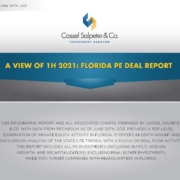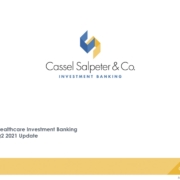September 15, 2021
Combined Company to Capitalize on Significant Growth in 5G,
Targeting Opportunities in mmWave and Multi-Edge Computing
SAN JOSE, CA and TORONTO, ON / ACCESSWIRE / September 15, 2021 / MoSys, Inc. (NASDAQ:MOSY) (“MoSys”), a provider of semiconductor solutions that enable fast, intelligent data access for cloud, networking, security and communications systems, and Peraso Technologies Inc. (“Peraso”), a global leader in the development of 5G mmWave silicon devices, announced today the signing of a definitive agreement (the “Arrangement Agreement”) for a business combination by way of a statutory plan of arrangement under the Business Corporations Act (Ontario) (the “Business Combination”). Upon the closing of the Business Combination (the “Closing”), the stockholders of Peraso are expected to hold, on a fully-diluted basis, a 61% equity interest in the combined company, with the remaining 39% equity interest to be retained by the stockholders of MoSys, assuming the Escrow Release Conditions (as defined below) are satisfied, or a 57.7% equity interest by the stockholders of Peraso and a 42.3% equity interest by the stockholders of MoSys, assuming the Escrow Release Conditions are not satisfied, in each case, as described further below. On Closing, MoSys will change its name to Peraso Inc. and expects shares of its common stock to continue to trade on the Nasdaq Capital Market under the new ticker symbol PRSO. The Arrangement Agreement and the Business Combination have been approved by MoSys’ and Peraso’s boards of directors and are subject to approval by MoSys’ and Peraso’s stockholders. The Business Combination is expected to close in the fourth quarter of 2021.
Management Commentary
“We are pleased to sign the Arrangement Agreement with Peraso, as we believe the Business Combination will provide substantial opportunities for our business across expanded high-growth markets,” stated Dan Lewis, MoSys’ Chief Executive Officer. “The combination will broaden our product lines, add operating scale and unlock potential selling synergies across common customers. Together, the company is uniquely positioned to target high-growth opportunities in 5G, as well as telecom and data networks. The deployment of 5G faces two key bottlenecks: the sub-6Ghz spectrum is exhausted and software-only solutions have become a limiting factor in effectively accelerating network hardware. Peraso’s market-leading mmWave technology, combined with MoSys’ accelerator engine ICs and virtual accelerator engine IP, directly addresses these bottlenecks and the significant spectrum needs of future 5G networks. With a combined IP portfolio of 130 patents, our technologies and solutions provide more bandwidth, better latency and faster throughput to meet the increased requirements of the more than 70 billion connected devices forecasted by 2030, as well as significantly expanded growth prospects beyond what MoSys can achieve as a standalone company.”
“It has been our goal at Peraso to develop market-leading technologies addressing the needs of the 5G market,” stated Ronald Glibbery, Chief Executive Officer of Peraso. “By joining with MoSys, we believe we can deliver a broader set of solutions to our combined customer base, using complementary technologies to address the networking and communication needs of our customers from the edge to the core and into the cloud. As a Nasdaq-listed company, Peraso will gain increased visibility and recognition, along with broader access to the global capital markets, which will support our long-term growth initiatives given the forecasted ramp in mmWave and 5G networks in the coming years. We believe the Business Combination provides meaningful benefit to both companies, their stockholders and other stakeholders. I am excited to become CEO of the combined company and look forward to working closely with Dan and all of the other members of the MoSys and Peraso teams, as we move forward.”
Business Combination Summary
The following is a summary of the key terms of the pending Business Combination, as contemplated by the Arrangement Agreement. The current report on Form 8-K filed by MoSys, Inc. with the U.S. Securities and Exchange Commission (“SEC”) will contain additional information about the Business Combination. The Closing is subject to the satisfaction or waiver of customary closing conditions, including approvals by stockholders of MoSys and Peraso. There can be no assurances that the Business Combination will be consummated. Pertinent terms of the Business Combination include:
The Business Combination will be implemented by way of a court-approved plan of arrangement under the Business Corporations Act (Ontario), under which a Canadian subsidiary of MoSys will acquire the issued and outstanding shares of Peraso. Peraso will survive the Business Combination and become a wholly-owned subsidiary of MoSys.
Directors, officers and significant stockholders of Peraso and the directors and officers of MoSys have entered into voting agreements under which the parties have agreed to vote their shares in favor of the Business Combination.
Peraso stockholders may elect to receive either shares of MoSys common stock or shares of a Canadian subsidiary of MoSys, which will be exchangeable into MoSys common stock (the “Exchangeable Shares”). Holders of Exchangeable Shares will be entitled to cast votes on matters for which holders of MoSys common stock are entitled to vote and will be entitled to receive dividends, if any, that are economically equivalent to the dividends, if any, declared by MoSys with respect to its common stock.
On a fully-diluted basis, the stockholders of Peraso will receive consideration of approximately 14.2 million shares of MoSys common stock or Exchangeable Shares on Closing, with approximately 1.8 million of such shares (the “Escrowed Shares”) to be deposited into escrow pursuant to the terms of an escrow agreement (the “Escrow Agreement”), such Escrowed Shares to be released to the stockholders of Peraso if, between 12 months and 36 months of the Closing, the common stock of the combined company achieves a VWAP (volume-weighted average price) of at least $8.57 per share for any 20 trading days within a period of 30 consecutive trading dates subject to earlier release upon a corporate sale or reorganization (the “Escrow Release Conditions”).
Prior to Closing, all debt of Peraso is to be converted into common stock or repaid in full, or will be reflected in an adjustment to the share exchange ratio.
The Arrangement Agreement also contains indemnification and termination provisions, and, under certain circumstances, requires the payment of a termination fee.
Management and Organization
The combined company will be led by Ronald Glibbery, Peraso’s CEO, with Dan Lewis, MoSys’ President and CEO, continuing to serve as President. The board of directors is expected to initially comprise five members, including three appointed by Peraso and two by MoSys.
Webcast Presentation
MoSys and Peraso invite all interested parties to view a webcast presentation by Ron Glibbery, Dan Lewis and Jim Sullivan for an overview of the combined company. The recorded presentation is available for viewing on the Investor Relations section of MoSys’ website or by clicking here.
Advisors
In connection with the Business Combination, Cassel Salpeter & Co. served as financial advisor to MoSys, and Mitchell, Silberberg and Knupp, LLP and Borden Ladner Gervais LLP served as legal counsel to MoSys. Evans and Evans served as financial advisor to Peraso and provided a fairness opinion to the board of directors of Peraso, and Stikeman Elliott LLP served as legal counsel to Peraso.
About MoSys, Inc.
MoSys, Inc. (NASDAQ:MOSY) provides both integrated circuits (ICs) and intellectual property (IP) solutions that enable fast, intelligent data access and decision making for a wide range of markets. MoSys’ primary product line is marketed under the Accelerator Engine name and includes the Bandwidth Engine IC products, which integrate its proprietary, 1T-SRAM high-density embedded memory and a highly efficient serial interface protocol resulting in a monolithic memory IC solution optimized for memory bandwidth and transaction access performance. In 2020, MoSys began offering for license its initial Virtual Accelerator Engine IP, which consists of software, firmware and related IP. The Virtual Accelerator Engine IP include multiple function accelerator platform products, which target specific application functions, initially Packet Inspection for routing, security and operations, and will use a common software interface to allow performance scalability over multiple hardware environments. For additional information on MoSys, Inc., please visit www.mosys.com.
About Peraso Technologies Inc.
Based in Toronto, Canada, Peraso is a fabless semiconductor company with a focus on the development of mmWave wireless technology and Wireless Gigabit (WiGig®) chipsets. Peraso is also a leading supplier of semiconductors in the PtP and PtMP markets. Since its inception in 2008, Peraso has developed a broad range of core competencies in the field of 5G mmWave semiconductors, including mmWave RF circuits, mmWave signal processing algorithms, beam forming and beam steering algorithms, real time calibration and system monitoring, low cost/high performance antenna technology and high volume production test capability. For additional information, please visit www.perasotech.com.
Additional Information and Where to Find It
A full description of the terms of the Business Combination will be provided in a proxy statement for the stockholders of MoSys (the “Proxy Statement”) to be filed with the SEC. MoSys urges stockholders, investors and other interested persons to read, when available, the preliminary Proxy Statement, as well as other documents filed with the SEC because these documents will contain important information about MoSys, Peraso, and the proposed Business Combination. The definitive Proxy Statement will be mailed to MoSys stockholders as of a record date to be established for voting on the proposed transaction. Stockholders will also be able to obtain a copy of the definitive Proxy Statement (when available), without charge, by directing a request to: MoSys, Inc, 2309 Bering Drive, San Jose, CA 95131, attention: CFO or by sending an e-mail to priv_IR@mosys.com. The preliminary and definitive versions of the Proxy Statement, once available, can also be obtained, without charge, at the SEC’s website (www.sec.gov).
Participants in Solicitation
Under SEC rules, MoSys, Peraso, and their respective directors, executive officers and other members of their management and employees may be deemed to be participants in the solicitation of proxies of MoSys’ stockholders in connection with the proposed Business Combination. Investors and security holders may obtain more detailed information regarding the names, affiliations and interests of MoSys’ directors in its Annual Report on Form 10-K for the fiscal year ended December 31, 2020, which was filed with the SEC on March 18, 2021. Information regarding the persons who may, under SEC rules, be deemed participants in the solicitation of proxies to MoSys’ stockholders in connection with the proposed Business Combination will be set forth in the Proxy Statement for the proposed Business Combination when available. Information concerning the interests of MoSys’ and Peraso’s participants in the solicitation, which may, in some cases, be different than those of MoSys’ and Peraso’s stockholders generally, will be set forth in the Proxy Statement relating to the proposed Business Combination when it becomes available.
Non-Solicitation
This press release is not a proxy statement or solicitation of a proxy, consent, or authorization with respect to any securities or in respect of the proposed Business Combination and shall not constitute an offer to sell or a solicitation of an offer to buy the securities of MoSys or Peraso, nor shall there be any sale of any such securities in any state or jurisdiction in which such offer, solicitation, or sale would be unlawful prior to registration or qualification under the securities laws of such state or jurisdiction. No offer of securities shall be made except by means of a prospectus meeting the requirements of Section 10 of the Securities Act of 1933, as amended.
No Offer or Solicitation to Sell
This communication is for informational purposes and is not intended to, and shall not, constitute an offer to sell or the solicitation of an offer to sell or the solicitation of an offer to buy any securities, nor shall there be any sale of securities in any jurisdiction in which such offer or sale would be unlawful prior to registration or qualification under the securities laws of any such jurisdiction.
Forward-Looking Statements
This press release contains forward-looking statements within the meaning of Section 27A of the Securities Act of 1933, as amended, and Section 21E of the Securities Exchange Act of 1934, as amended, which are intended to be covered by the “safe harbor” created by those sections. All statements in this release that are not based on historical fact are “forward looking statements.” These statements may be identified by words such as “estimates,” “anticipates,” “projects,” “plans,” “strategy,” “goal,” or “planned,” “seeks,” “may,” “might”, “will,” “expects,” “intends,” “believes,” “should,” and similar expressions, or the negative versions thereof, and which also may be identified by their context. All statements that address operating performance, development of the events, objectives or goals, refinement of strategy, and anticipation of certain behavior of stockholders in connection with MoSys, Peraso, or the Arrangement Agreement, the expected synergies, and other financial benefits from the Business Combination, that are not otherwise historical facts, are forward-looking statements.
There can be no guarantee that the proposed Business Combination described in this press release will be completed, or that they will be completed as currently proposed, or at any particular time. Actual results may vary materially from those expressed or implied by the statements here due to changes in economic, business, competitive or regulatory factors, and other risks and uncertainties affecting the operation of the businesses of MoSys and Peraso. There are a number of specific factors related to the Business Combination, including:
- The ability of MoSys and Peraso to obtain stockholder approval for the Business Combination and related transactions;
- The ability of Peraso to obtain court approval for the plan of arrangement implementing the Business Combination;
- The ability of the combined company to successfully maintain a Nasdaq Capital Market listing;
- The ability of the combined company to successfully integrate the operations of MoSys and Peraso;
- Conditions to the Closing that may not be satisfied or that the Business Combination may involve unexpected costs, liabilities, or delays;
- The occurrence of any other risks to consummation of the Business Combination, including the risk that the Business Combination will not be consummated within the expected time period or any event, change or other circumstances that could give rise to the termination of the Arrangement Agreement;
- Risks that the Business Combination disrupts current MoSys’ plans and operations or that the business or stock price of MoSys may suffer as a result of uncertainty surrounding the Business Combination;
- Risks related to the COVID-19 pandemic, including public health requirements in response to the outbreak of COVID-19 and the impact on MoSys’ business and operations; and
- MoSys or Peraso may be adversely affected by other economic, business, or competitive factors.
MoSys does not intend to update publicly any forward-looking statement for any reason, except as required by law, even as new information becomes available or other events occur in the future.
For further information:
Investor Relations Contact:
Shelton Group
Leanne K. Sievers | Jeffrey Schreiner
949-224-3874 | 512-243-8976
sheltonir@sheltongroup.com
MoSys, Inc. Contact:
Jim Sullivan, CFO
MoSys, Inc.
408-418-7500
jsullivan@mosys.com
Peraso Technologies Inc. Contact:
Ronald Glibbery, CEO
Peraso Technologies Inc.
416-637-1048
ronald@perasotech.com
SOURCE: MoSys, Inc.
Click here to read the full article.
Click here to read the PDF.










